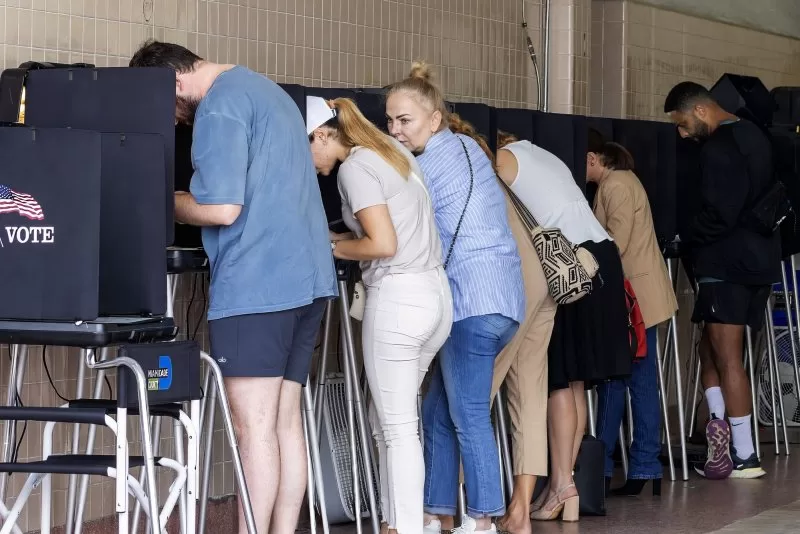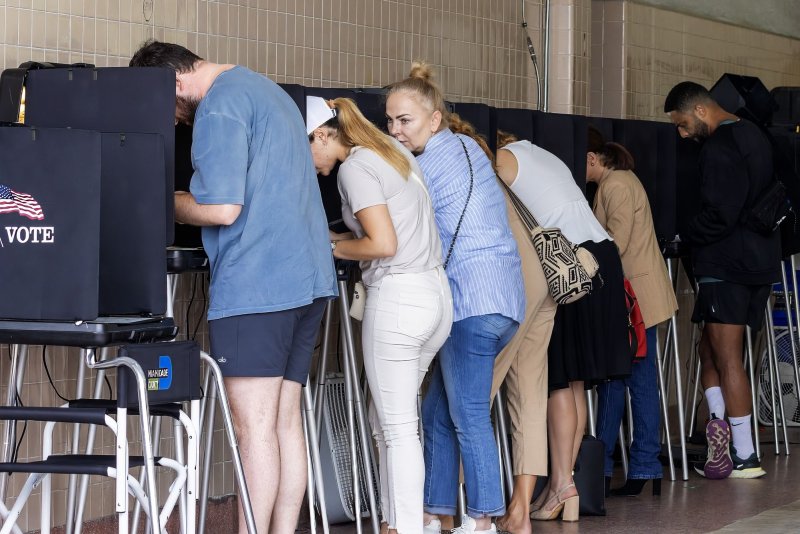Florida residents are seen filling in their ballots on election day for Democrat and Republican Presidential candidates along with down ballot candidates in Miami on Tuesday. Florida is among nine states with measures related to abortion rights on the ballot. Photo by Gary I Rothstein/UPI |
License PhotoNov. 5 (UPI) — Abortion rights are on the ballot Tuesday in 10 states as voters continue to contend with the fallout of the Supreme Court‘s decision to overturn Roe vs. Wade.
Voters in Arizona, Colorado, Florida, Maryland, Missouri, Montana, Nebraska, Nevada, New York and South Dakota will take to the polls and weigh measures that will alter or amend their constitutions to protect abortion rights in the absence of the federal protections previously provided by the landmark Supreme Court case.
Arizona
Arizona voters will consider Proposition 139 which, if passed, would create a “fundamental right to abortion” under the state’s constitution.
It would alter the state’s constitution to declare that the state would not be able to interfere with the fundamental right of abortion before fetal viability “unless it has a compelling reason and does so in the least restrictive way possible.”
The measure describes “fetal viability” as “the point in the pregnancy when, in the good-faith judgement of a treating health care professional, the fetus has a significant likelihood of survival outside of the uterus.”
If passed, the measure would prevent the state from interfering with “the good faith judgment” of a doctor that an abortion is necessary to protect the life or health of a pregnant person for the length of the pregnancy, both before and after fetal viability.
It would also protect against state penalties for aiding or assisting a pregnant person in receiving an abortion.
A 50% “yes” vote is required for the measure to pass.
Colorado
Colorado’s Amendment 79 would add a section to Article II of the state’s constitution recognizing abortion rights.
If passed with 55% or more of the vote, the measure would add “Section 32. Abortion” to the article which states:
“The right to abortion is hereby recognized. Government shall not deny, impede, or discriminate against the exercise of that right, including prohibiting health insurance coverage for abortion.”
Florida
In Florida, Amendment Four seeks to “limit government interference with abortion” in wake of the state imposing a law that bans abortion after the gestational age of a fetus is determined to be more than six weeks.
The measure, which requires 60% approval to pass, would amend the state’s constitution to state that “no law shall prohibit, penalize, delay, or restrict abortion before viability or when necessary to protect the patient’s health as determined by the patient’s healthcare provider.”
The amendment does not alter the legislature’s authority under the constitution to require that a parent or guardian be notified before a minor has an abortion.
Maryland
Question 1 in Maryland will ask voters whether the state should amend the state’s constitution to introduce a new section that guarantees a right to reproductive freedom.
It states that “reproductive freedom” includes but is not limited to “the ability to make and effectuate decisions to prevent, continue, or end the individual’s pregnancy, and provides the state may not, directly or indirectly, deny, burden, or abridge the right unless justified by a compelling state interest achieved by the least restrictive means.”
It must receive more than 50% of the vote to pass.
Missouri
Missouri’s Amendment Three would alter the state’s constitution to enshrine reproductive freedom in the state.
The language of the bill says the constitution would be amended to include a clause that would bar the state government from infringing on a person’s right to “make and carry out decisions about all matters relating to reproductive health care, including but not limited to prenatal care, childbirth, postpartum care, birth control, abortion care, miscarriage care, and respectful birthing conditions.”
It would, however, allow the state to restrict abortion access after fetal viability and in instances where “such action is justified by a compelling governmental interest achieved by the least restrictive means.”
The measure must receive a simple majority to pass.
Montana
Montana’s Ballot Issue 14 would amend the state’s constitution to guarantee the right to an abortion up until fetal viability or to protect the life of the patient.
The amendment states that the government would be prohibited from penalizing patients, healthcare providers or anyone who assists someone seeking or carrying out an abortion. Abortion is currently banned in Missouri except when to protect the life of the mother or to preserve a pregnant person’s health.
Providing an abortion in violation of the state’s law is a class B felony.
Ballot measures require a simple majority to pass.
Nebraska
Nebraska has two initiatives on the ballot related to abortion access.
Initiative 434 would amend the state constitution to ban abortions in the second and third trimesters unless the pregnancy is the result of sexual assault or incest.
Initiative 435 would amend the state constitution to enshrine the right to an abortion until fetal viability or when needed to protect the life of the mother.
Abortion is currently banned after 12 weeks of pregnancy in Nebraska, with exceptions for rape, incest and when there is a threat to the patient’s life.
Ballot initiatives need a simple majority to pass in Nebraska and at least 35% of votes cast must affirm the initiative.
Nevada
Nevada’s Question Six is a state constitutional amendment — the Reproductive Freedom Amendment — seeks to enshrine the right to have an abortion as a fundamental right. The state “may regulate the provision of abortion care after fetal viability.”
The state would be prohibited from penalizing or prosecuting any individual based on the outcome of their pregnancy.
The ballot measure requires a simple majority to pass and it must pass in consecutive elections. This is the first time this amendment has been on the ballot. If it passes on Tuesday, it will need to pass again in 2026 to take effect.
South Dakota
South Dakota’s Amendment G is a measure to establish the right to an abortion in the state constitution and create a legal framework for regulating abortion.
If passed, the state would be able to regulate abortion access only after the first trimester. Proponents of the measure say it effectively restores the rights once protected by the Roe vs. Wade decision.
The state enacted a near-total ban on abortion in 2022, making it a felony to perform an abortion with an exception for saving the life of the mother.

